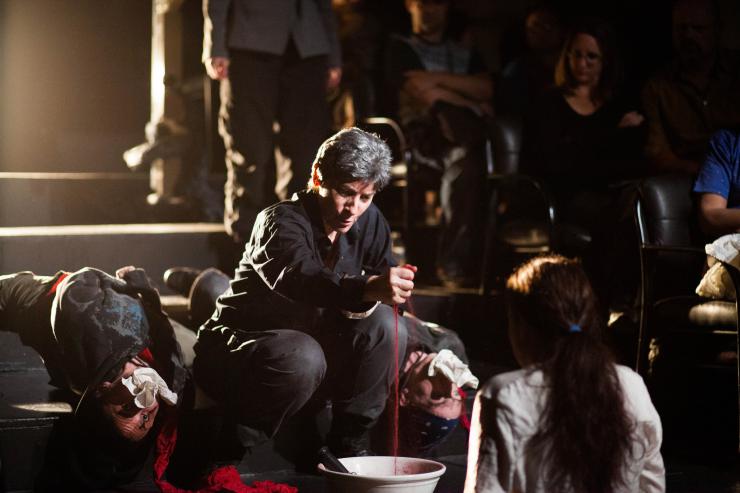Taffety Punk’s Riot Grrrls Wring Humor from Titus Andronicus
T.S. Eliot called Titus Andronicus "one of the stupidest and most uninspired plays ever written…” Samuel Johnson deemed it impossible to produce—“the barbarity of the spectacles,” he said, “and the general massacre which are here exhibited can scarcely be conceived tolerable to any audience.” But Taffety Punk, resident company at Washington DC’s Capitol Hill Arts Workshop, has taken on the challenge. Titus Andronicus is the most recent in a series of Shakespeare plays the Riot Grrrls, as they call themselves, have produced with an all-female cast.
The play is a bold choice for the young theater company whose mission is to make classical and contemporary work exciting and meaningful. I saw Titus Andronicus years ago at one of DC’s large and well established Shakespeare-producing theaters and left enervated, horrified, and certain the play was at least an hour too long. Taffety Punk’s barebones production—the set consists of a gnarled tree, a table and four chairs—is meaningful, skillful, and enjoyable, if that term can be applied to a play that incorporates fourteen murders, rape, cannibalism, beatings, and various severed body parts.
One of the problems critics have found with the play over the years is that it lends itself, at certain points, to parody. The critic Harold Bloom in “Shakespeare: The Invention of the Human” (1998), notes of a production, the audience laughed in scenes that were supposed to be tragic, such as when Lavinia is told to carry Titus' severed hand in her mouth. I don’t remember any laughter in the wrenching production I saw years ago—only unalloyed horror.

Taffety Punk’s approach is not to smooth over or ignore the farcical elements in the play but rather to exploit them. And yes, people laughed. The play, as a result, was bearable and interesting. In the final banquet scene, while Queen Tamora is being fed her slaughtered sons in an empanada, Titus kills his daughter, Lavinia. “Why have you—mmm,” she interrupts herself, chewing appreciatively—“killed your only daughter?” In Taffety Punk’s hands, this final scene approaches black comedy of the Pulp Fiction type.
Taffety Punk’s approach is not to smooth over or ignore the farcical elements in the play but rather to exploit them
The audience laughs with relief. The slaughter that ends the play, too, provokes smirks for its very extremity. Rather than trying to push the play into a fully tragic mode, Taffety Punk allows it to be loose and incongruous and funny in parts. The pace is kept up, the play never seems too long, and all the performances are lively and extremely professional.
The members of Riot Grrrls, despite the punk edginess their name connotes, nearly all have extensive training or a solid background in Shakespearean acting. Isabelle Anderson, an Australian who plays Titus Andronicus, is a founding faculty member of the Shakespeare Theatre’s Academy for Classical Acting at George Washington University. She is masterful as Titus Andronicus, portraying a character who is in equal parts cruel, commanding, sympathetic, and self-pitying.
Under Lise Bruneau’s skillful direction, the actors deliver their lines in a way that elucidates their meaning. Never have I encountered a Shakespeare play in which the language is so immediately accessible. In Taffety Punk’s production, the play is not just a parade of horrors. It’s a social critique.
Titus Andronicus returns to Rome hardened after ten years of war and the loss of numerous sons. Although he is hailed as “noble” and “good,” these attributes are soon thrown into question. He progresses from the brutal execution of his enemy, Tamora’s son to the senseless murders of his own children—his son, Mutius and his raped and mutilated daughter, Lavinia. The play’s bloodbath culminates in the infamous banquet scene in which Titus serves Tamora her sons ground up in a pie, before proceeding to slay her.
The opening scenes of the play rapidly usher in the themes of vengeance and death. “O cruel, irreligious piety!” Queen Tamora exclaims when Titus Andronicus orders her son killed to avenge the deaths of his own sons in battle, and she is correct. This act is not one of piety but of power cruelly and mistakenly applied. War is prompted often by just that belief: if we kill other people’s sons, our dead will somehow be appeased.
Sara Waisanen, as Tamora, is persuasive as both the desperate, entreating mother of the soldier and the hard and commanding wife of the emperor. Tamora plays a mother figure to the emperor, as well as his lusty lover. With an all-female cast, the power Tamora has over her husband can be represented physically; Waisanen towers over the diminutive Tia Shearer, who convincingly plays the emperor Saturninus as an immature, easily offended, and weak man.
Amanda Forstrom and Teresa Spencer, as Tamora’s sons Chiron and Demetrius, are masterful. They radiate adolescent awkwardness, an eagerness to be cool, and an almost endearing joie de vivre with their slouches, gangsta style, and exuberant high fives—all in poignant counterpoint to their evil acts.
Rana Kay is convincing as a delicate, proud, and resourceful Lavinia. Tiernan Madorno is well cast as Aaron, the blood-thirsty and conniving Moor who is having an affair with Tamora. Madorno has a powerful presence and lends dimensionality to Aaron, who would be a wholly evil character if not for a convincing tenderness displayed toward the baby conceived with Tamora.
Bruneau maintains the suspense of the play, moving quickly and smoothly through the scenes. The costumes—a mix of Roman attire and modern garb—are designed to heighten the mix of the contemporary and the Elizabethan that runs through the play. Lavinia’s white lace dress, which suggests her innocence, is shockingly smeared with blood after her rape and mutilation. Lucius (Jenna Berk) threatens the captured Aaron with a handgun. The gun is surprising and discordant but brings the violence of the play onto familiar ground, making the horror more relatable.
One of Bruneau’s most interesting choices is to include as a sound effect the plaintive crying of Tamora and Aaron’s baby. The baby wails as Aaron is urged by the nurse, Chiron, and Demetrius to kill the child. Aaron decides instead to save the baby, and when Aaron is captured he extracts a promise from Lucius to nurture and raise the child. After the murders of the final scene, the baby cries again. We expect Lucius to break his promise—one more betrayal of trust among the play’s many. We brace for the baby’s murder. It doesn’t come. Lucius and his followers exchange questioning, apprehensive glances, but no one raises his hand against the child. Taffety Punk’s production ends on that note of hope.
Titus Andronicus is well suited to a theater on Capitol Hill. While the level of cruelty in the play calls Syria to mind, one need not look so far. At the White House each Tuesday night a list is drawn up of those to be executed without trial, put to death with a missile fired from a drone (in spite of the government shut-down, drone flights continued.) Our own war captives, while not burned alive, certainly have been murdered in some instances. What such acts bring about, as the play makes clear, is a cycle of vengeance and bloodshed. Better to take Lavinia’s course. Rather than offering her fallen brothers the burned and mutilated corpse of a captured enemy soldier, she gives them a tribute of tears.








Comments
The article is just the start of the conversation—we want to know what you think about this subject, too! HowlRound is a space for knowledge-sharing, and we welcome spirited, thoughtful, and on-topic dialogue. Find our full comments policy here